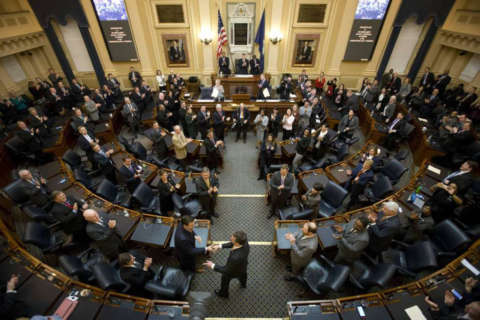WASHINGTON — Teenagers sending explicit photos back and forth could be guilty of a misdemeanor rather than a felony, under a bill approved Monday by the Virginia Senate.
Under current law, minors who even consensually send photos to each other are guilty of felonies.
“What you have is basically someone in possession of or transmitting child pornography, but yet they are a child, and so it’s either an all-or-nothing proposition in those cases … you either charge them with a felony where a felony conviction for possession or transmitting such child pornography results in a pretty significant result and being on a sex offender list, or you do nothing,” said Sen. Bill Stanley, R-Va., of Franklin County.
The new bill, which passed 35-5 and now goes to the House of Delegates, would provide prosecutors with the alternative of charging the teens with a misdemeanor.
If charged with a misdemeanor, there would also be an opportunity to have a first-time charge dismissed after performing community service.
Stanley sponsored the bill with Sen. Scott Surovell, D-Va., of Fairfax County.
“We need to start this conduct off at the misdemeanor level so that people don’t feel the need to involve law enforcement. If it’s a misdemeanor, then they can feel more comfortable taking care of it as parents or clergy or teachers or whatever,” Surovell said.
Sen. Chap Petersen, D-Va., representing Fairfax City, argued the bill may still be too broad.
“Which one among us in our youth wouldn’t have violated that at some point?” Petersen said.
He called for more involved parenting as the solution.
“This happens all the time,” Petersen said. “Here’s what the other option is: You take the phone away … You don’t need a statute to take the phone away.”
Several lawmakers cited estimates that around a third of high-school aged kids have sent or received messages that would qualify as sexting.
Under the bill, it would also be a misdemeanor for one minor to send another any other type of sexually explicit image or video, even of an adult. It does not prevent a felony child pornography charge in sexting cases, where prosecutors believe it would be more appropriate.
“Technology has changed us in ways that when we were growing up, we never had these things that come at us at the speed that they do for our children now,” Stanley said.
Hanover Sen. Ryan McDougle, R-Va., praised the idea of the bill, but worried that it leaves too many cases now open to misdemeanor prosecution.
“I do think we are setting up a system, even though we’re intending to lessen the burden … (it’s) going to result in more children having petitions sworn out against them, more children being in court. And, I do think that it’s a concept we need to continue to work on. I don’t think that this bill is the finished product that should come out of the Senate,” McDougle warned.
Arlington Sen. Barbara Favola, D-Va., backed the bill as a way to prevent children from being branded as felons.
“What this bill does, in my mind, is it enables a more rational approach in dealing with a situation where you have a teenager who doesn’t fully understand the consequences of an action,” Favola said.
Sen. Amanda Chase, R-Va., agreed, worried not just about sexting being treated as a felony but also potentially unintended fallout from things that might be classed more as practical jokes.
“Kids are kids, and they play around and they do dumb things,” Chase said.







